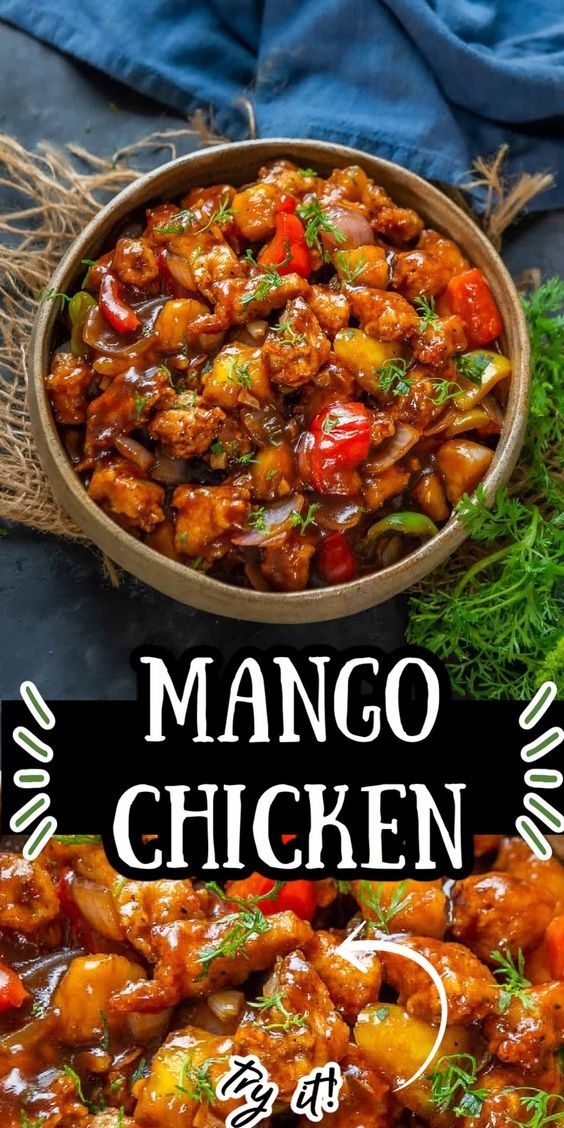
The Night Market That Ignited a Passion
It was a humid evening in a bustling Taipei night market, neon lights flickering and the air thick with the aroma of sizzling woks, when I first tasted a mango chicken stir-fry that stopped me in my tracks. I was 24, backpacking through Asia, my taste buds already dizzy from street food adventures. A vendor with a weathered smile tossed chunks of ripe mango into a fiery wok with chicken and peppers, finishing it with a glossy sauce that was sweet, tangy, and just spicy enough. One bite—juicy mango, tender chicken, and a sauce that danced between savory and sweet—and I was smitten. My first attempt to recreate it back home was a disaster: soggy mango, bland sauce. But after years of tweaking, from hostel kitchens to my home stovetop, I’ve nailed a version that captures that night market magic. This recipe is my ode to that Taipei moment, with every mistake I made—overcooked fruit, watery sauce—turned into lessons for you.
This Chinese-style mango chicken stir-fry is a vibrant, quick dish that balances sweet mango, savory chicken, and a glossy umami sauce. Perfect for weeknight dinners or impressing friends with a tropical twist, it’s a one-pan wonder. I’ll guide you through every step to keep the mango bright and the flavors bold.
Why This Stir-Fry Shines
What makes this dish unique? This stir-fry blends the tropical sweetness of mango with the savory depth of a Chinese-inspired sauce, creating a dish that’s both familiar and exotic. The chicken is tender and lightly crisped, the mango adds juicy bursts of flavor, and the sauce—soy, hoisin, and a touch of chili—ties it all together with umami and heat. Unlike heavy takeout dishes, this stir-fry is light, colorful, and packed with veggies. It’s ready in under 30 minutes, customizable for spice or diet, and forgiving if you slightly overcook the mango. It’s a taste of summer with Asian flair, perfect for any night you crave something fresh yet comforting.
Ingredients: The Heart of the Wok
Every ingredient is chosen for flavor, texture, and speed, refined through countless stir-fry experiments. From Asian markets to supermarket aisles, here’s what you need for 4 servings.
- Chicken Breast (1 lb, boneless, skinless): Tyson or Perdue for lean, tender meat. Slice thinly for quick cooking. Thighs work for richer flavor but add fat. Pro tip: I used thick slices once, and they were chewy—slice to 1/4-inch thickness.
- Mango (2 medium, ripe but firm, peeled and cubed): Ataulfo or Kent for sweet, less fibrous flesh. Ripe but not mushy—press gently; it should give slightly. Frozen mango works but thaw and pat dry. I used overripe mango once, and it dissolved—firm is key.
- Bell Peppers (2, one red, one yellow, sliced): For color and crunch. Green peppers work but are less sweet. I overcooked them once—keep them crisp.
- Soy Sauce (3 tbsp, low-sodium): Kikkoman for umami without oversalting. Regular soy can overpower—I made that mistake early on.
- Hoisin Sauce (2 tbsp): Lee Kum Kee for sweet-savory depth. Oyster sauce can sub but is saltier. I used too much hoisin once, and it was cloying—measure carefully.
- Rice Vinegar (1 tbsp): Marukan for tangy balance. Apple cider vinegar works in a pinch.
- Garlic (3 cloves, minced): Fresh for punch. Jarred garlic is flat—I tried it and it fell short.
- Ginger (1 tbsp, grated): Fresh for zesty warmth. Ground ginger (1/2 tsp) is a last resort.
- Red Chili Flakes (1/2 tsp): McCormick for adjustable heat. Skip for mild or double for fire lovers.
- Cornstarch (1 tsp): For velveting chicken and thickening sauce. Arrowroot for gluten-free.
- Vegetable Oil (2 tbsp): Neutral like Crisco for high-heat cooking. Olive oil burns too easily.
- Green Onions (3, sliced): For garnish and sharp freshness. Chives can sub.
- Sesame Seeds (1 tbsp, toasted): For nutty crunch. Toast in a dry pan for 30 seconds—untoasted lacks flavor.
- Rice or Cauliflower Rice (2 cups, cooked): Uncle Ben’s jasmine for serving. Cauliflower rice for low-carb.
Substitutions That Keep the Vibe
- No chicken breast? Thighs for juicier meat or shrimp for a seafood twist. Tofu for vegetarian—press and cube it.
- No mango? Pineapple chunks mimic the sweet-tart vibe but are juicier—pat dry.
- No hoisin sauce? Mix soy sauce, honey, and a pinch of garlic powder (2:1:1/4 ratio).
- Gluten-free? Use Tamari or coconut aminos instead of soy sauce; arrowroot for cornstarch.
- Low-carb? Serve over cauliflower rice or zucchini noodles.
Tools: Wok or Skillet, No Drama
You don’t need a chef’s kitchen. I’ve made this in a hostel with a borrowed pan and in my home with a trusty wok. Here’s what you need:
- Wok or Large Skillet: A 12-inch Lodge cast-iron skillet or carbon steel wok for high heat and even cooking. Nonstick works but misses the sear. I used a small pan once, and it was chaos—go big.
- Spatula or Tongs: For tossing. Wooden spatula for woks; tongs for skillets. Plastic spatulas melt—I learned the hard way.
- Sharp Knife: Wüsthof for slicing chicken, mango, and peppers. A mandoline speeds up peppers but isn’t essential.
- Small Bowl: For mixing sauce. Glass or ceramic is best.
- Cutting Board: Plastic or wood, cleaned well to avoid cross-contamination.
Do I need a wok? A wok is ideal for high-heat tossing, but a large skillet works just as well. A grill wok adds smoky flair if you’re outdoors, but a stovetop is perfect for home cooks.
Step-by-Step: Stir-Frying with Flair
This recipe serves 4 and takes about 25 minutes. Prep all ingredients before heating the pan—stir-fries are fast-paced.
Step 1: Prep the Chicken
Slice 1 lb chicken breast into 1/4-inch strips. In a bowl, toss with 1 tsp cornstarch, 1 tbsp soy sauce, and 1 tsp vegetable oil. Let sit 10 minutes to “velvet” for tenderness. I skipped this once, and the chicken was dry—don’t rush it.
Step 2: Mix the Sauce
In a small bowl, whisk 2 tbsp hoisin sauce, 2 tbsp soy sauce, 1 tbsp rice vinegar, 1/2 tsp chili flakes, and 1/4 cup water. Set aside. I made a thin sauce once—measure carefully for balance.
Step 3: Cook the Chicken
Heat 1 tbsp vegetable oil in a wok or skillet over high heat until shimmering. Add chicken in a single layer and cook 2–3 minutes per side until golden and 165°F (74°C). Remove to a plate. I overcrowded once, and it steamed—work in batches.
Step 4: Stir-Fry the Veggies
Add 1 tbsp vegetable oil to the pan over high heat. Add 3 minced garlic cloves and 1 tbsp grated ginger, stirring 30 seconds until fragrant. Add sliced bell peppers and stir-fry 2–3 minutes until crisp-tender. I overcooked peppers once, and they were mushy—keep them vibrant.
Step 5: Add Mango and Sauce
Add cubed mango and cooked chicken to the pan. Pour in sauce and toss 1–2 minutes until thickened and glossy. If too thick, add 1 tbsp water. Taste and adjust with soy or chili flakes. I added mango too early once, and it broke down—add it last.
Step 6: Serve with Style
Divide over 2 cups cooked rice or cauliflower rice. Garnish with green onions and sesame seeds. I skipped the garnish once, and it missed that final pop—don’t skip.
Common Mistake: Overcooking mango or crowding the pan. Add mango at the end and cook in batches for crisp texture. I had a soggy batch once—high heat and timing are key.
Pairings, Variations, and Serving Vibes
What drinks pair well? A Tsingtao beer or Riesling complements the sweet-savory balance. Non-alcoholic? LaCroix mango or Lipton peach iced tea. I tried a heavy Cabernet once, and it overpowered—keep it light.
Side Dishes: Serve with edamame, cucumber salad with sesame dressing, or spring rolls (Ling Ling brand). Sticky rice or jasmine rice soaks up the sauce.
Variations:
- Spicier: Add 1 tsp sriracha or fresh chili slices with the garlic.
- Milder: Skip chili flakes or use 1/4 tsp.
- Vegetarian: Swap chicken for tofu or mushrooms.
- Low-Carb: Use cauliflower rice or shirataki noodles.
- Gluten-Free: Use Tamari and gluten-free hoisin sauce.
Serving Tip: Serve family-style in a large bowl with extra sesame seeds and chili flakes. I ran out of sauce once—double it if you love it saucy.

